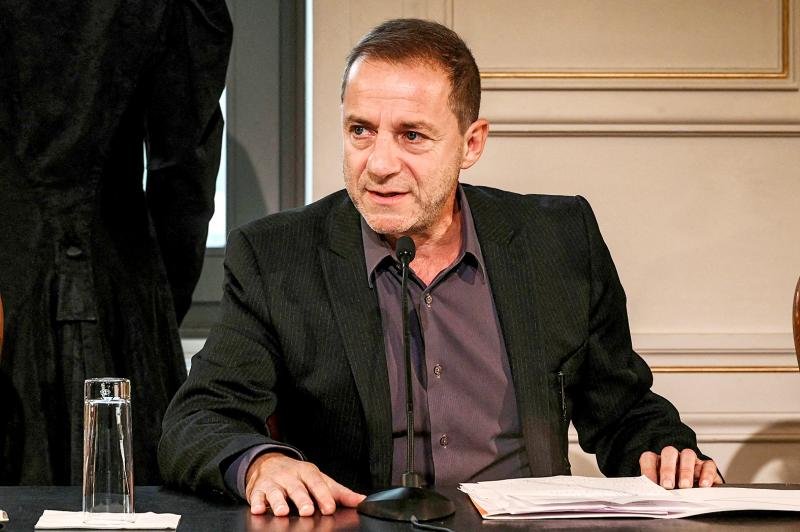The former artistic director of the National Theatre of Greece was on Saturday arrested over allegations of rape against minors, amid a belated #MeToo awakening.
Dimitris Lignadis, a renowned actor and director, faces accusations of serial rape and indecent assault, an arrest warrant said.
Lignadis, 56, resigned on Feb. 6 citing a “toxic climate of rumors, innuendo and leaks.”

Photo: AFP
He is at the center of numerous allegations of sexual abuse of minors, Greek media have reported.
He was detained a day after Greek Minister of Culture and Sports Lina Mendoni said she had asked the supreme court prosecutor to look into rumors circulating about him and publicly described him as “a dangerous person.”
“We strongly pressured Lignadis to say if he was the one named in the rumors ... there was a steady denial that the rumors were about him,” Mendoni said.
“He deceived us, he deceived me,” she added.
Her comments angered Lignadis, who shot back: “If I am a dangerous man in my personal life or in my work, I think we should wait for this to be decided by the history and by other institutions.” Lignadis’ lawyer, Nikos Georgouleas, said his client rejected all the accusations and that he was arrested after presenting himself to the authorities.
A complaint was on Friday filed against Lignadis regarding the rape in 2010 of a 14-year-old boy, the Athens News Agency (AND) reported.
The now 25-year-old plaintiff is the second person that has accused the director of rape, ERT TV reported.
The prosecutor received another deposition late on Friday night, ANA said.
This witness alleged that he was at Lignadis’ home with friends under 18, where Lignadis was plying them with alcohol and drugs, and asking them to have group sex.
The Lignadis case has sparked a war of words between the government and opposition parties that have called for Mendoni’s resignation accusing her of dragging her feet in the case.
Alexis Tsipras, leader of main opposition party Syriza, on Friday said that the government had attempted a “cover-up” adding that Greek Prime Minister Kyriakos Mitsotakis was “a friend of Lignadis.”
“It’s truly obscene that Mr Tsipras tries to take advantage of all these shocking revelations, giving them a party-related tone,” a statement issued by the prime minister’s office said late on Friday.
Mitsotakis “knew Lignadis only for his theatrical performances which he attended,” it added.
More than three years after the #MeToo movement surfaced in the US, the code of silence in Greece was broken by a two-time Olympic sailing medalist Sofia Bekatorou.
Bekatorou in December last year alleged she was 21 when she was subjected to “sexual harassment and abuse” by a senior federation member in his hotel room, shortly after trials for the 2000 Sydney Olympics.
Several other high-profile figures including actors and university professors have also been embroiled in accusations of bullying, harassment and abuse in the past few weeks.
Giorgos Kimoulis, regarded as one of Greece’s finest actors, has been removed from this year’s Athens and Epidaurus Festival after a flurry of bullying claims from actresses, and one of the country’s top comedians, Petros Filippidis, has been removed from a popular state TV show after claims of lewd behavior by actresses.
However, under Greek law few of the complaints can be prosecuted as they allegedly occurred too long ago.

Chinese President Xi Jinping (習近平) is to visit Russia next month for a summit of the BRICS bloc of developing economies, Chinese Minister of Foreign Affairs Wang Yi (王毅) said on Thursday, a move that comes as Moscow and Beijing seek to counter the West’s global influence. Xi’s visit to Russia would be his second since the Kremlin sent troops into Ukraine in February 2022. China claims to take a neutral position in the conflict, but it has backed the Kremlin’s contentions that Russia’s action was provoked by the West, and it continues to supply key components needed by Moscow for

Japan scrambled fighter jets after Russian aircraft flew around the archipelago for the first time in five years, Tokyo said yesterday. From Thursday morning to afternoon, the Russian Tu-142 aircraft flew from the sea between Japan and South Korea toward the southern Okinawa region, the Japanese Ministry of Defense said in a statement. They then traveled north over the Pacific Ocean and finished their journey off the northern island of Hokkaido, it added. The planes did not enter Japanese airspace, but flew over an area subject to a territorial dispute between Japan and Russia, a ministry official said. “In response, we mobilized Air Self-Defense

CRITICISM: ‘One has to choose the lesser of two evils,’ Pope Francis said, as he criticized Trump’s anti-immigrant policies and Harris’ pro-choice position Pope Francis on Friday accused both former US president Donald Trump and US Vice President Kamala Harris of being “against life” as he returned to Rome from a 12-day tour of the Asia-Pacific region. The 87-year-old pontiff’s comments on the US presidential hopefuls came as he defied health concerns to connect with believers from the jungle of Papua New Guinea to the skyscrapers of Singapore. It was Francis’ longest trip in duration and distance since becoming head of the world’s nearly 1.4 billion Roman Catholics more than 11 years ago. Despite the marathon visit, he held a long and spirited

The pitch is a classic: A young celebrity with no climbing experience spends a year in hard training and scales Mount Everest, succeeding against some — if not all — odds. French YouTuber Ines Benazzouz, known as Inoxtag, brought the story to life with a two-hour-plus documentary about his year preparing for the ultimate challenge. The film, titled Kaizen, proved a smash hit on its release last weekend. Young fans queued around the block to get into a preview screening in Paris, with Inoxtag’s management on Monday saying the film had smashed the box office record for a special cinema